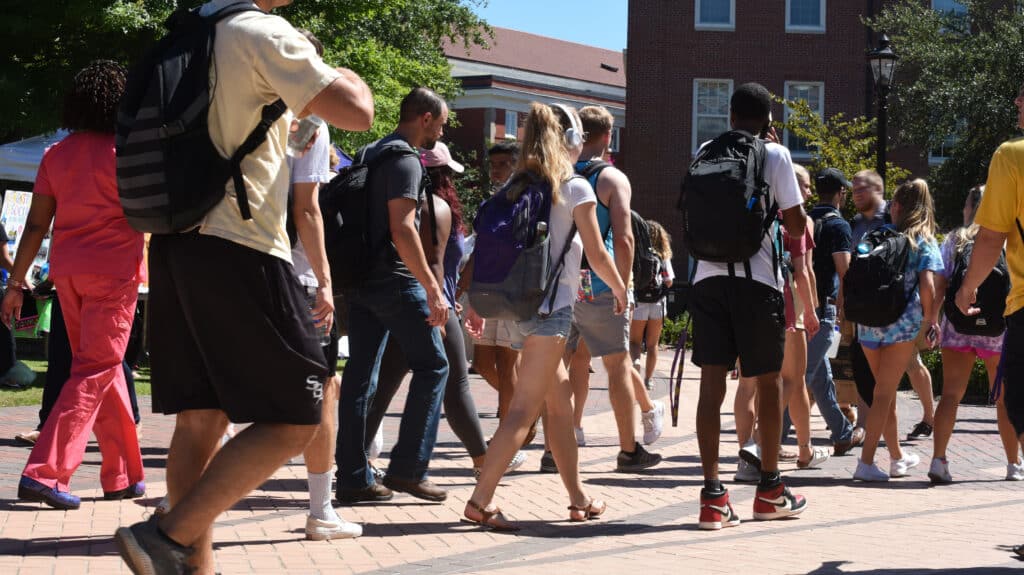College is a place for American youth to explore, grow, discover, and develop into successful and optimistic adults. But undergraduate students also face heavy workloads, peer pressure, and high rates of anxiety and depression.
Many young adults ultimately choose to abuse prescription drugs in order to cope, sometimes leading to the development of serious substance use disorders.
When this occurs, many students are reluctant to admit that they have a problem or to get help. But the short-term and long-term risks that come with prescription drug abuse are simply too great to ignore.
College-Aged Prescription Drug Abuse Statistics
According to the latest figures published by the Substance Abuse and Mental Health Services Administration (SAMHSA), prescription drug abuse among college-aged Americans has generally declined in recent years, though millions of Americans are still impacted.
The most commonly abused prescription medication types for young adults ages 18-25 are:
Stimulant Drugs
3.7% of Americans in this age group, or 1.3 million people, misused prescription stimulant medications in the last year.
These medications, including amphetamines (Adderall), dextroamphetamine (Dexedrine), and methylphenidate (Ritalin) are prescribed to treat attention-deficit hyperactivity disorder (ADHD) and narcolepsy. They work by increasing dopamine activity in the brain and boosting CNS activity.
On college campuses, prescription stimulants are widely bought and sold under the assumption that they may boost academic performance, allowing students to study longer and harder, and providing a burst of energy for finals.
Unfortunately, prescription stimulant misuse can be habit forming, cause cardiovascular damage, trigger overdoses or psychosis, and produce other acute and chronic negative effects.
Tranquilizers & Sedatives
2.4% of those in this age group, or around 842,000 people, misused prescription drugs with primarily calming, sleep-inducing, or anxiety relieving effects in the last year.
These medications, which are divided among several different drug classes, may be used by young adults to self-medicate against stress and anxiety or to produce a relaxed high.
However, this abuse can lead to dangerous side effects or even overdoses, especially if alcohol or other drugs are also consumed.
Painkillers
Around 3.2% of those in this age group reportedly misused opioid pain medications in the past year, or around 1.1 million people total.
Opioid drugs like hydrocodone (Vicodin), oxycodone (Oxycontin), methadone, and codeine are prescribed to treat moderate to severe pain.
Opioid drugs work by binding to opioid receptors in the central nervous system, changing how the body senses pain and strongly relaxing feelings of stress, worry, and tension.
Unfortunately, both illicit and prescription opioids are widely abused for their euphoric effects at higher doses, sometimes causing life-threatening and even fatal overdoses as well as harmful and chronic patterns of illicit drug abuse and addiction (opioid use disorder).
Prescription Drugs & Alcohol-Related Risks
While any illicit use of prescription drugs is dangerous, the above-average consumption of alcohol by full-time college students greatly increases the already high risk and danger of prescription substance abuse issues in this population.
Many young people severely underestimate the potency of alcohol and the many dangers that come with binge drinking.
Overdose & Mental Health Problems
When alcohol consumption mixes with the use of stimulants, depressants, or other classes of drugs, the effects of both substances may be dangerously enhanced, and the stain placed upon the body and mind can increase dramatically.
This all results in a much greater risk of drug overdose or other medical emergencies, as well as greater risks of long-term physical health problems as well as mental health problems like suicidality, anxiety, and depression.
If you or one of your family members has been struggling with drug abuse or addiction, it is vital that you get the help you need to recover.
To learn more about your treatment options, please reach out to our team today.
People Also Read:
- Can You Stay Enrolled In Your College Courses During Outpatient Rehab?
- Adderall Vs. Modafinil | Similarities & Differences
- 5 Signs That Your Vyvanse Dose Is Too High
- Vyvanse Vs. Ritalin | Which Is Best For ADHD?
Sources:
- National Institute on Alcohol Abuse and Alcoholism (NIAAA) – Harmful Interactions
- National Institute on Drug Abuse (NIDA) – What classes of prescription drugs are commonly misused?
- Substance Abuse and Mental Health Services Administration (SAMHSA) – Key Substance Use and Mental Health Indicators in the United States: Results from the 2022 National Survey on Drug Use and Health
- The University of Michigan Institute for Social Research – MONITORING THE FUTURE PANEL STUDY ANNUAL REPORT, 2022

